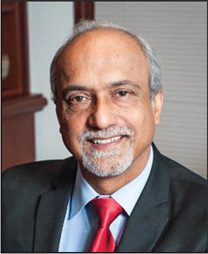BY VIRENDER SODHI
Four out of 100 teenagers become seriously depressed each year. Everybody feels sad now and then; but if they’re sad most of the time, and it’s causing problems in school and with relationships with family and friends, they may be clinically depressed.
What is depression? Clinical depression is a serious illness that can affect anybody, including teenagers. It can affect their thoughts, feelings, behavior and overall health. Common symptoms are poor appetite, insomnia or excessive sleep habits, hyperactivity or inactivity, loss of interest or pleasure in usual activities, fatigue, feelings of worthlessness or self-reproach, diminished ability to think or concentrate, and recurrent thoughts of death or suicide. Intense bouts of depression that last for weeks at a time are called major depression. A less severe form can linger at a low level for years. A third form is a depressive reaction to a specific life event, such as a death, divorce or other loss, when the adjustment to the loss takes longer than normal or is more severe than expected and interferes with the person’s daily activities. And there is another condition, bipolar disorder (also called manic depressive illness), in which periods of major depression alternate with periods of abnormally high mood and extreme bursts of unusual activity, called mania.
What causes depression? Depression can be the result of psychological as well as physiological factors. The predominant psychological theory asserts that depression is the result of habitual feelings of pessimism and hopelessness. The chief physiological theory points to imbalances of monoamine neurotransmitters such as serotonin, epinephrine, and norepinephrine. Serotonin deficiency is the most common biochemical cause.
It is important to screen for the various simple, organic factors which are known to contribute to depression. These include nutrient deficiency, hypoglycemia (low blood sugar), hypothyroidism (low thyroid function) and drugs–not only prescription and illicit drugs, but also alcohol, caffeine, nicotine, etc. Although it is uncommon to perform lab tests in the diagnosis of depression, I run a thorough blood and urine test for these factors to determine if any of them is causing a chemical imbalance.
The brain requires a constant supply of blood sugar to function properly, so hypoglycemia must be avoided. Symptoms of hypoglycemia can range from mild to severe and can include depression, anxiety, irritability, fatigue, headache, blurred vision, mental confusion, incoherent speech and convulsions. Several studies have shown that hypoglycemia is common in depressed individuals. Simply eliminating from the diet refined carbohydrates and caffeine, which can aggravate hypoglycemia, is sometimes sufficient treatment for those whose depression results from hypoglycemia.
Food allergy is a causative factor in other cases of depression. Eliminating offending foods can bring about tremendous relief.
A deficiency of any single nutrient can alter brain function and lead to depression, anxiety and other mental disorders. Particularly essential in this context are vitamin B12, folic acid and other B vitamins, and the omega-3 fatty acids.
What are the standard treatments for depression? Most people are treated with counseling, or psychotherapy, which is talking about feelings with a trained psychologist who can help one change the relationships, thoughts or behaviors that are causing the depression. Your child may feel depressed because she thinks her life is bad. What if she is wrong? What if her future holds a lot more promise than she thinks? When someone is depressed, they are in a rut, and they can’t see anything positive. They need to talk to someone who can help them get out of that rut. Young people should seek help from parents or their school counselor. Parents need to take a very active role by first recognizing that their child is depressed and then providing all the help they can.
Some people are helped with counseling and medicine. Doctors routinely prescribe a number of different antidepressant medications. These differ in their side effects and levels of effectiveness. The most common drugs prescribed today for depression are the selective serotonin reuptake inhibitors (SSRIs), including fluoxetine (Prozac), fluvoxamine (Luvox), paroxetine (Paxil) and sertraline (Zoloft). Other similar drugs are venlafaxine (Effexor), nefazodone (Serzone), clomipramine (Anafranil) and bupropion (Wellbutrin). All of these drugs correct decreased levels of specific neurotransmitters in the blood that can cause or contribute to depression.
Do these drugs pose risks to children and teens? In 2003 the British Medicines and Healthcare Regulatory Agency banned the pediatric use of all SSRIs except Prozac due to evidence from clinical trials showing that children taking SSRIs were driven to acute emotional distress, leading some of them to become suicidal and homicidal. In December, 2003, after reviewing 22 clinical trials showing that children using nine SSRIs were on average almost twice as likely to become suicidal, senior US Food and Drug Administration epidemiologist Dr. Andrew D. Mosholder recommended a ban on pediatric use of the drugs. The FDA barred him from presenting his conclusions publicly and commissioned researchers at Columbia University to re-examine the data. Their findings were virtually the same. In September, 2004, the FDA released a long-awaited analysis concluding that young patients taking antidepressants could be at increased risk for self-harm. They directed manufacturers to add black-box warnings (the most serious kind of warning) on doctor labeling to describe the increased risk of suicidality in young people being treated with antidepressants. The label wording includes a reminder that Prozac is currently the only medication approved to treat depression in children and adolescents. The FDA also planned to develop a patient medication guide to be given along with prescriptions.
Although increased risk of suicidal behavior in youth may be the worst side effect of antidepressant drugs, there are many others. In my article in the coming October/November/December, 2007, issue of Hinduism Today I will offer natural remedies from the ayurveda tradition that I have found to be effective in the treatment of depression.


